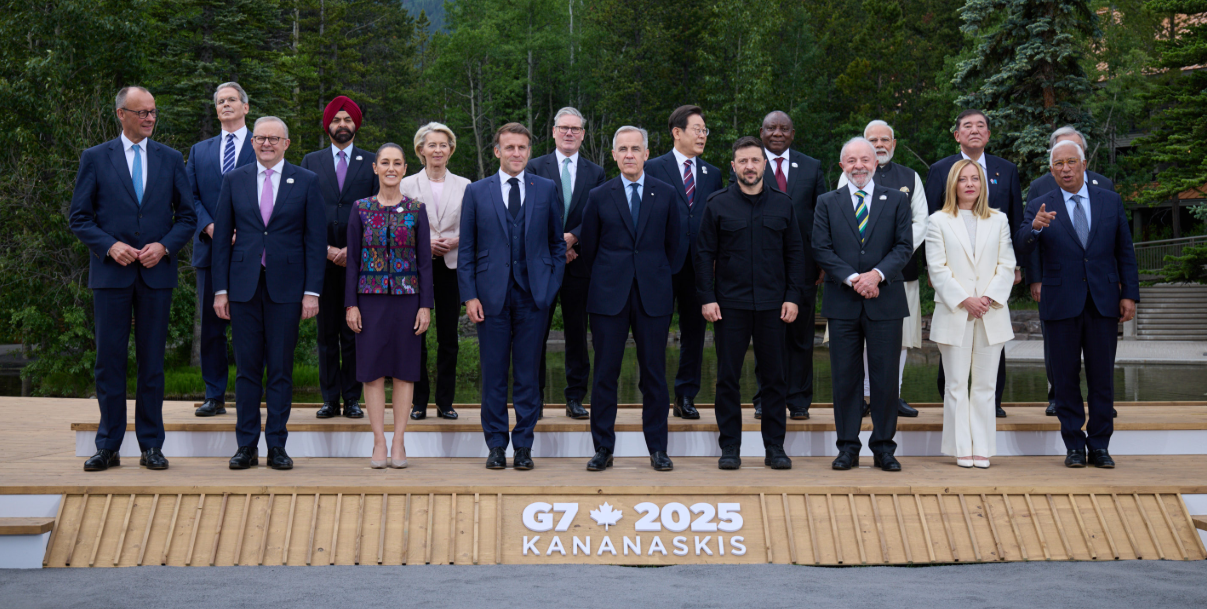G7 Split as Russia Pounds Kyiv with 440 Drones and 32 Missiles:The G7 summit in Canada exposed sharp divisions among global leaders as Russia launched one of its deadliest attacks on Kyiv since 2022. With President Trump returning to Washington due to the Israel-Iran conflict, President Zelensky urged for more global pressure on Moscow after 440 drones and 32 missiles struck Ukraine, killing civilians including an American. Canada announced a $1.47 billion aid package, while the US blocked stronger condemnation of Russia to keep mediation options open.
G7 Split as Russia Pounds Kyiv with 440 Drones and 32 Missiles
In a dramatic turn of events, the Group of Seven (G7) leaders convened in Canada to address global crises, but their unity was notably shaken by conflicting positions over the Ukraine war. The summit took place against the backdrop of one of Russia’s most severe aerial assaults on Ukraine since the full-scale invasion began in February 2022.
While six of the G7 leaders reaffirmed their commitment to supporting Ukraine, President Donald Trump was conspicuously absent. Trump, who had been scheduled to meet with Ukrainian President Volodymyr Zelensky at the summit in Canada, was forced to return to Washington early due to escalating tensions in the Israel-Iran conflict. Zelensky instead met with the other leaders at a secluded lodge in the Canadian Rockies, even as Russian missiles pounded his country.
The latest Russian barrage on Kyiv proved devastating. At least 16 people were killed in Ukraine’s capital, and over 100 were injured. This marked one of the worst attacks on Kyiv in over three years. According to President Zelensky, the strikes involved a staggering 440 drones and 32 missiles fired across Ukraine in a single night, bringing more horror to a country already ravaged by war. Among the dead was a U.S. citizen, which drew strong condemnation from the U.S. State Department.
“We are aware of last night’s attack on Kyiv, which resulted in numerous casualties including the tragic death of a U.S. citizen,” a State Department spokesperson said. “We condemn those strikes and extend our deepest condolences to the victims and their families.”
President Zelensky emphasized the urgent need for international support. “It’s important for our soldiers to be strong at the battlefield, to stay strong until Russia is ready for peace negotiations,” Zelensky stated. He further called for an unconditional ceasefire but acknowledged that achieving this would require immense international pressure on Moscow.
Zelensky says;
Together, we must continue urging President Trump to use the influence he really has – to force Putin to end this war. It was the U.S. and President Trump who proposed a ceasefire, the resumption of diplomacy, immediate meetings and negotiations. But Russia has blocked every effort,This war continues because of Russia. From the start, it has been an unprovoked and criminal war of aggression. We must not forget that. We must continue applying pressure in every direction – diplomatic, economic, military – to finally bring peace.
In response to the devastating strikes, Canadian Prime Minister Mark Carney announced a significant new military aid package for Ukraine worth $1.47 billion. The assistance includes advanced drones, helicopters, and ammunition. Furthermore, Canada joined Britain, Australia, and the European Union in tightening sanctions on Russia’s so-called “shadow fleet” — ships that Russia uses to evade sanctions and continue oil exports.
Prime Minister Carney elaborated: “We are providing additional military assistance — drones, helicopters, broader munitions — over $2 billion worth of assistance directly to Ukraine. Additionally, we are dispersing the next tranche of loans based on frozen Russian assets, amounting to over $2 billion as well.”
However, the G7 summit exposed growing fractures among allies. Despite the strong show of support from several member nations, the group failed to release a unified joint statement condemning Russia. According to reports from a Canadian official, the United States objected to the language that harshly condemned Russia, arguing that such wording could jeopardize its position as a potential mediator in future negotiations with Russian President Vladimir Putin.
This divergence underscores the complex geopolitical balancing act the U.S. is attempting as it navigates its strategic interests in both Eastern Europe and the Middle East. While other G7 members pushed for a strong, unified stance against Russian aggression, Washington appeared more cautious, emphasizing its potential role in future diplomacy with Moscow.
As Russia continues its brutal campaign, President Zelensky’s call to the international community remains clear: “Do not turn a blind eye.” The recent attacks serve as a grim reminder that the war is far from over, and global unity remains fragile in the face of unrelenting aggression.
Disclaimer:
This article is for informational purposes only. The content is based on available news reports and official statements as of the time of publication. The situation may evolve further as more information becomes available.

